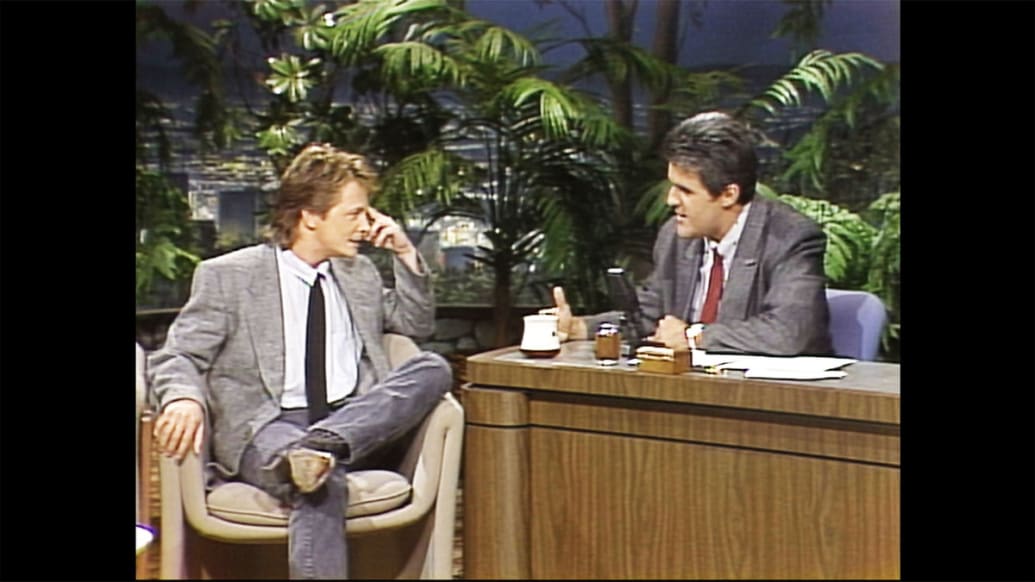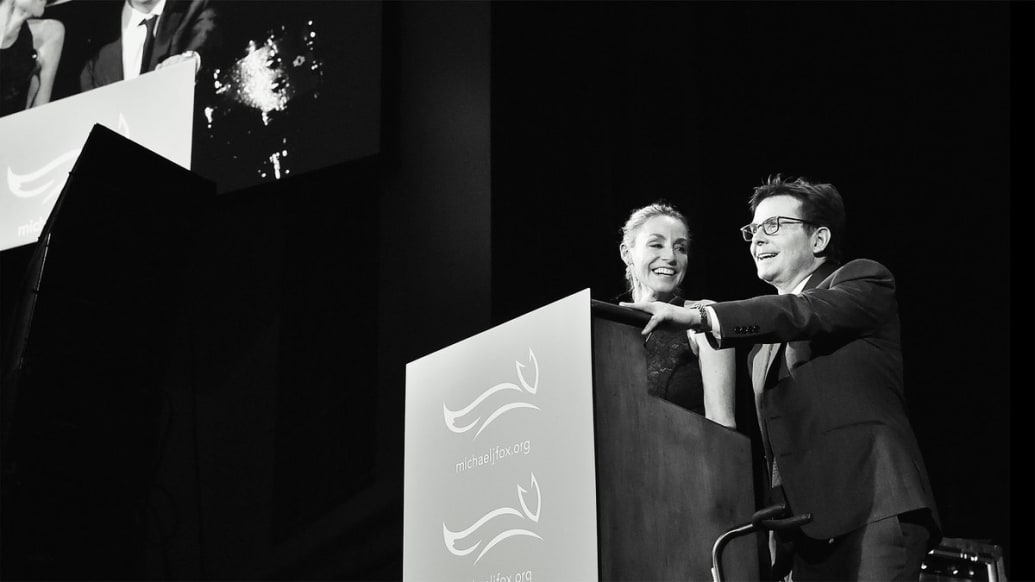In 1998, Michael J. Fox shocked millions of fans by making his Parkinson’s diagnosis public for the first time.
At the time, he was playing on one of the biggest hits on television. Rotation City, heralded a new, triumphant stage in the career of the beloved and successful star. He was also very young, only 37 years old. But part of the revelation was that Fox received his diagnosis seven years ago, when he was just 29 years old. progressive disorder is often associated with the elderly. There was an air of palpable public grief that followed the bewilderment that made the headlines.
In the nearly three decades since then, Fox has become an activist and open book, continuing her acting career, particularly among her groundbreaking work lobbying for Parkinson’s research with the Michael J. Fox Foundation.
These are all things covered in the new documentary. Photograph: A Michael J. Fox Moviewhich premiered at the Sundance Film Festival earlier this year and is currently streaming on Apple TV+. But first, Oscar-winning director Davis Guggenheim (An Inconvenient Truth Waiting for “Superman” He Put Me Malala) didn’t think you were the right person to lead him.
It took time for the Guggenheim to convince himself it was, but that certainty gave way to new concerns. wanted to make sure Still It wasn’t going to be the documentary you’d expect about Fox, because Fox’s story isn’t what you’d expect either. Davis spoke with The Daily Beast’s Obsessed about the devastating tropes about celebrities and survivors, and the powerful, surprising lessons Fox can teach us.
The “celebrity documentary” became its own genre, sometimes notorious for being puffy or hagiographic. Did you think Still Did you approach it as a “celebrity documentary” or in a different way?
When I first read your book [Lucky Man: A Memoir]“This is really good. I wonder who should run this.” I have this [production] company, and I was like, “Who would be great for this?” I guess my first instinct was that it wasn’t me. Maybe it was my own prejudice about what you just said. Am I prejudiced against famous movies? It’s like, “Oh, it’s going to be one of them.”
What changed your mind?
As you think deeper, [I realized that] There are layers to this story that defy this “famous doctor” and “the doctor about a man with a disease.” These are the two kinds of archetypal stories the movie has to turn upside down. There are parts of this story – about hiding, running away, not doing the right thing when he has Parkinson’s – that I think is very compelling, interesting, and unique. It defies the typical rags-to-riches, “big celebrity disgrace” genre. There’s more than that, and more than just the man who got a disease and became a hero.
Did you consciously try to avoid these expectations while making the movie?
It was an important breakthrough [we found] when cutting the film. He told Michael, “Everyone is focused on his story right now. Is this the sad story of a man who has a debilitating disease and crushes him? And Michael thinks for a minute. Then he looks up and says, “No, that’s boring.”
Oh, I definitely remember that line from the movie.
What matters is the moment before it, where you see it as it is now. wakes up. She is taking her meds. Their feet are really tight, like those of Parkinson’s patients. Then you see your hand in the sink trying to apply toothpaste. [his toothbrush]. The idea of this [scene] Having the audience like, “Oh, it’s going to be one of those movies.” Then I asked that question, he said “boring”. So the idea is to turn it around and say, “Okay. Look at him differently.”
Did he get you excited when he said that? That this isn’t a story that fits those tropes must have confirmed what you thought.
It’s in his article. His books are very well written. There’s a wonderful storytelling of how he wakes up in a Florida hotel wiggling his finger and thinks it’s a moth. It has great storytelling about it. family ties And Return to the future at the same time. And obviously, he’s Michael J. Fox, so he’s funny. But there is some wisdom in what he has to say that really interests me. They have something to say about life. He is 60 years old. I am almost 60 years old. This struck me as very powerful as to what it meant to be mortal.

Do you think it matters whether the producer of a famous documentary like this one admires the work of the subject?
We’re both lucky to have [a fan and a non-fan]. The film’s editor is Michael Hart, he’s an uber fan and is responsible for using Michael J. Fox’s films as archival footage in ways I can’t even imagine. I was just a regular fan. I haven’t watched all of his movies. I was watching different movies in the 80s. I was watching much more serious movies. So we both had a different approach. [to the material]. I think this helped. If I was just an uber fan, the movie could have gone too far. And if anyone knew anything about them, I think you’d lose the fun Michael Hart finds in fiction.
I’m guessing you had a firm expectation of what Fox would be like from reading his book. When you got to know him while shooting this movie, was there anything that upset your expectations of him?
We have prejudices against people with disabilities. We also have a prejudice against people who are funny. The Academy Awards rarely honor funny people. This is weird. “Oh, Michael J. Fox, he’s funny. He is handsome. He’s quick to joke.” And maybe the next thought is, “Oh, [he’s probably] not particularly deep.” The surprise of Michael, which I feel is part of my bias, is that he is incredibly deep.
There is deep wisdom in his books and there is deep wisdom in this movie. He learned something that few people on the planet have learned what it means to live together – I wouldn’t even call it a disability – a heavy, heavy burden. How he chooses to deal with it affects me a lot. And very useful. As a man in the world, as a 59-year-old person, he taught me a way of living that I didn’t have before making this movie.
I remember when Fox first made his Parkinson’s diagnosis public. Every news program was talking about it. It was on the cover of every magazine. Do you remember your reaction to his announcement back then?
I remember going, “This is so young. Isn’t Parkinson’s a disease of the elderly?” But still, I wasn’t the one watching Rotation City every week. There are some people who feel very close to him because they watch everything. I was not that person. […] I probably said “This is sad” and went on with my day. Only now do I understand how big of a deal this is, that he has kept this secret for so long, and what it means to keep this secret.
It’s really incredible that she keeps this secret.
Self-acceptance is surprisingly beautiful to me. My favorite part of this movie is because it was liberated. He was liberated as an actor. he is inside good wife. Curb the enthusiasm My favorite thing he’s ever done. And he was liberated as a person. He’s a movie star. She looks older and has trouble walking, but is resigned. This is surprisingly beautiful to me.

I hadn’t thought of it until now, but I remember Fox was in the audience for Julia Louis-Dreyfus’ movie at Sundance. You hurt my feelingsand asked a question during Q&A. It was difficult to understand him and he had a hard time holding the microphone, but he still understood. I think that explains exactly the point you just made.
Yes. Like “fuck it”. Like, “If you can’t understand me, that’s your problem.” Another quote I love from the movie: I told him, “When people see you walking, they say, ‘Oh my God. I’m not pathetic I’ve got shit on my head
I like this line.
at the beginning of the movie [when he first says it]sounds casual and arrogant. However, this attitude is hard to gain. It took years to get to this point. That’s why people are so affected by it.
At the Sundance premiere, there were people who were excited for the movie because they wanted to see a teardrop. What do you think of predictive people? Still be this kind of documentary?
When I presented this to Apple, I said, “I don’t want to make a documentary. I want to make an 80’s movie. Big music, big music, so typical of ’80s movies.”
I think people expect something from this movie. I have friends who say “I’m coming to your movie”. I’m bringing my box of tissues with me.” It’s kind of weird, because people usually cry in this movie.

There must have been people crying when I saw them.
But what I don’t want to do is follow the trope. I don’t think Michael wants to be put in a box. He doesn’t want to be seen as a hero. I think he wants to be seen as Michael J. Fox. He’s a new taker living his life and wanting to be understood.
You mentioned how people sometimes react, “Oh, dammit” when they see Fox or other people with Parkinson’s start to tremble. There is a great scene good wife That’s what’s used in the movie where Fox tells a jury about his character’s trembling and says something like “You’ll get used to it.” You spent a lot of time with him doing this. What is your experience of being comfortable with his movements and way of speaking?
This is a great question and you are the first to mention this line. I think that’s her talent: she helps you get used to it faster than anyone else. “I am a cockroach. You can’t kill a cockroach.” And you’ll be like, “Okay, fine.”
Another great line.
I think disabled people are scary for people. I guess seeing someone in Michael J. Fox’s situation is confrontational. He’s talking about it. What really happens is, “Damn, I hope this isn’t me.” You see someone in need on the street and you say, “God, I hope it’s not me.” “I hope I don’t have Parkinson’s.” “I hope I don’t have to be in a wheelchair.”
We have an unspoken bias and an unspoken projection of ourselves. We support. We try not to. We try to be really kind, good people. It’s a natural reaction. But I think one of Michael’s gifts is to break that relationship and say, “I’m a father. My kids are making fun of me. I still have a quick joke. I’m flawed. I did some bad things. I did good things. Look at me as a human being.” This is her gift.
Keep being obsessed! Sign up for Daily Beast’s Obsessed newsletter and follow us Facebook, twitter, instagram And TikTok.